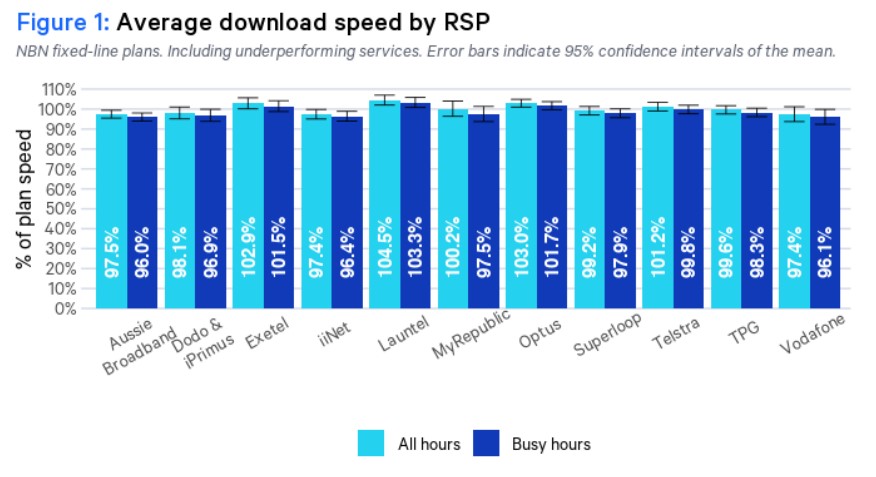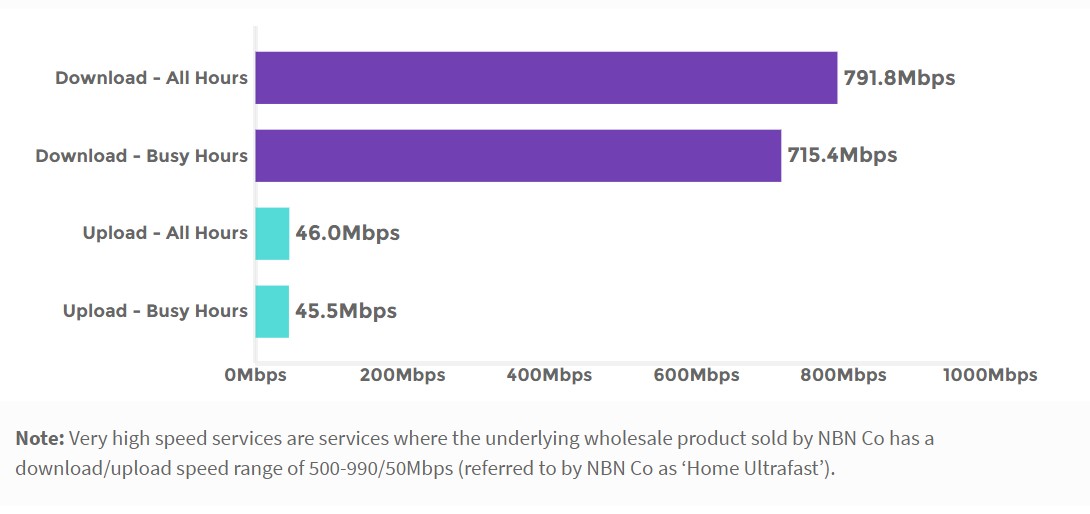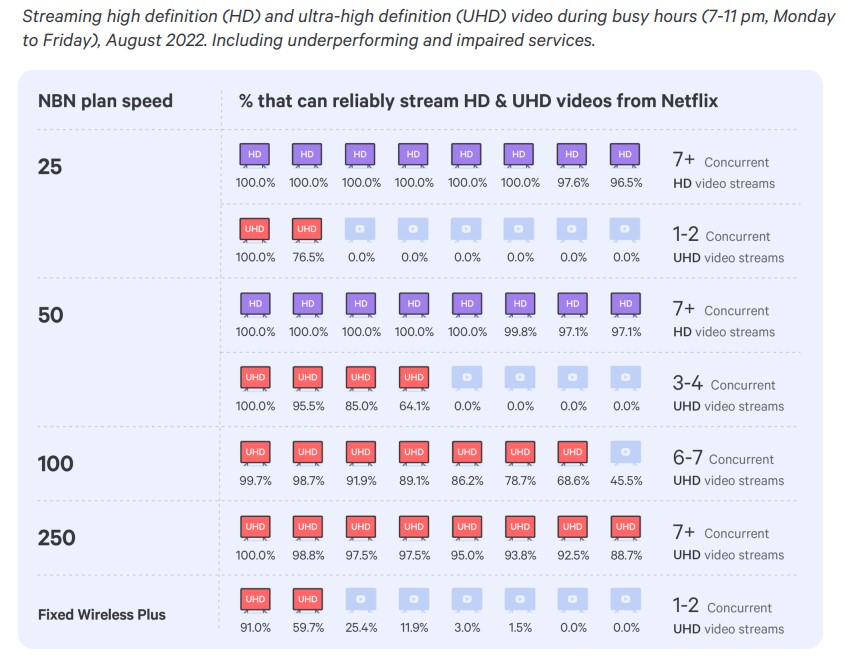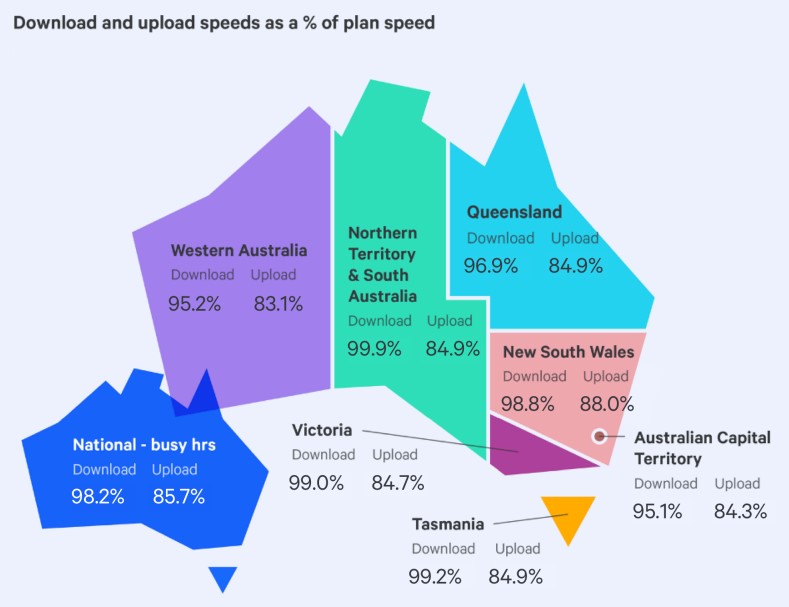Australians are enjoying increasingly fast NBN from the best-known internet providers — but when it comes to download speeds, it’s a smaller telco that’s outstripping the competition.
The Australian Competition and Consumer Commission (ACCC) has released its 19th quarterly Measuring Broadband Australia report, which uses real-world data to determine how close the nation’s biggest NBN providers are to delivering advertised internet speeds. The report compiles the average download and upload speeds of 12 telcos, based on each brand’s performance during the August 2022 testing period.
In great news for NBN users, overall speeds for fixed-line connections have improved since the previous quarter, with more providers delivering a stronger performance during the typically-congested evening hours. However, the consistently-fastest telco is also the most recent addition to the ACCC’s report; less than a year after first entering the Measuring Broadband rankings, Launtel has claimed the crown as Australia’s speediest NBN provider.
The Tasmanian telco beat out previous winner Exetel and big names Optus, Telstra and TPG to take out the number-one spot for download speeds during the busy evening hours. On average, Launtel achieved a download speed of 103.3 per cent of the maximum advertised plan speeds in peak usage periods, and 100.5 per cent during the busiest usage hour.
Fastest NBN download speeds
The ACCC’s report measures the performance of thousands of fixed-line fibre NBN connections as a percentage of each plan’s maximum attainable speed (although due to over-provisioning of bandwidth by NBN Co, some providers are able to exceed 100 per cent in busy periods). The higher the percentage, the faster on average a telco’s performance was across the testing period.
Analysing the average speeds achieved during the most congested evening hours of between 7pm and 11pm, Exetel was consistently fastest at 103.3 per cent, followed by Optus with 101.7 per cent. Last quarter’s winner Exetel rounded out the top three with 101.5 per cent, with Telstra in fourth place at 99.8 per cent.
The full download speed results are:
- Launtel: 103.3%
- Optus: 101.7%
- Exetel: 101.5%
- Telstra: 99.8%
- TPG: 98.3%
- Superloop: 97.9%
- MyRepublic: 97.5%
- Dodo & iPrimus: 96.9%
- iiNet: 96.4%
- Vodafone: 96.1%
- Aussie Broadband: 96.0%
Looking at all 12 telcos, the average fixed-line download speed in busy hours was 98.2 per cent of the maximum attainable speed. Providers met or exceeded their maximum download speeds in 92 per cent of tests run between 7pm and 11pm, up from 88 per cent of tests performed in the May quarter.

“Launtel’s performance in August shows that emerging and smaller retailers can provide similar, if not better, performance than the larger telcos,” ACCC Commissioner Anna Brakey said.
“A combination of retailers sustaining strong performance and providing more accurate information in their advertising means that more consumers are getting what they pay for in their NBN plan.”
Compare NBN plans
If you’re looking to see how some of these telcos stack up on price and features, you can compare unlimited data NBN 50 plans below.
The following table shows a selection of published unlimited Standard Plus Evening Speed (NBN 50) plans from Canstar Blue’s database, listed in order of standard monthly cost, from the lowest to highest and then by data allowance, largest to smallest. Use our NBN comparison tool see plans from a range of other providers. This is a selection of products with links to a referral partner.
NBN 1000: how ultrafast plans compare
The ACCC also looked at the performance of ‘very high speed’ NBN services, which include NBN ultrafast plans with a maximum download speed of 1000Mbps. 44,412 download tests were performed on high speed connections; of these, 45.7 per cent achieved a download speed of at 900Mbps or faster.
Throughout August, the hourly average download speeds across these plans ranged from 654Mbps to 828Mbps, with performance decreasing most noticeably in the evening. The average download speed across all providers was 791.8Mbps, and 715.4Mbps during the busy evening period. The difference between the maximum daily speed and the average 8pm speed was around 175Mbps, showing that these ultrafast plans are more susceptible to network congestion than services on slower speed tiers.

The best NBN speeds for Netflix
With streaming services responsible for a significant increase in broadband usage across Aussie homes, the ACCC’s report also tests how reliably providers can deliver multiple high definition (HD) Netflix streams. The ACCC looked at how many HD and ultra high definition (UHD) streams can be streamed across each NBN speed tier simultaneously on fixed-line and fixed wireless connections, with tests again performed during the 7pm-11pm peak period.
This quarter’s report indicates that 100 per cent of NBN 25 plans can support up to six HD streams at once, but only one UHD stream. NBN 50 is capable of supporting one concurrent UHD stream, or five HD streams, while NBN 100 supported a single UHD stream in 99.7 per cent of tests. The fastest speed tested, NBN 250, could support one UHD stream in 100 per cent of tests, two UHD streams in 98.8 per cent of tests, and three UHD streams in 97.5 per cent of tests.

Fastest NBN speeds by state
The ACCC has recently introduced a state-by-state breakdown of average busy hour NBN speeds. The Northern Territory and South Australia achieved the fastest average downloads, performing at 99.9 per cent of the maximum available speed. The Australian Capital Territory’s download speeds were the slowest, at 95.1 per cent, while New South Wales logged the fastest upload performance at 88.0 per cent of the maximum.

Fastest NBN upload speeds
As with downloads, upload speeds were also slightly faster across the board when compared to the previous quarter. Fixed-line services achieved an overall average upload speed of 85.7 per cent in busy hours, up from 85.3 per cent in the ACCC’s prior report.
While retailers still focus on download speeds as a key measurement of performance, fast uploads can be crucial for customers who rely on their internet for activities such as gaming, sending large files, making video calls or working from home. Not all NBN providers advertise their typical upload speeds, but the ACCC anticipates this will change within the next few months.
“We expect retailers to make their typical busy period upload speeds available for fixed-line services by the end of January next year, and by the end of April for fixed wireless services,” Ms Brakey said.
Looking at August, Exetel again delivered the fastest average uploads at 88.7 per cent of the maximum, followed by Launtel at 88.5 per cent and MyRepublic with 88.1 per cent.
The full upload speed results are:
- Exetel: 88.7%
- Launtel: 88.5%
- MyRepublic: 88.1%
- Superloop: 87.0%
- Optus: 86.9%
- Dodo & iPrimus: 86.7%
- Telstra: 86.5%
- Vodafone: 85.9%
- Aussie Broadband: 84%
- TPG: 83.5%
- iiNet: 83.1%


Share this article